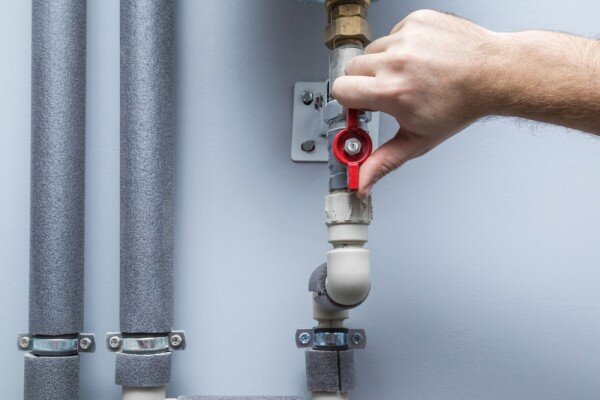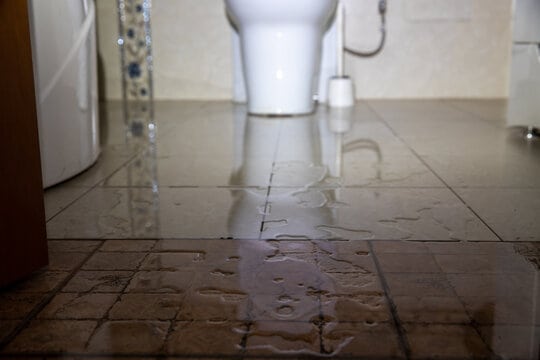Having one of your tenants call you and tell you that they have water damage in their apartment is terrible! You’re probably wondering, where did it come from? Can you fix it? Do you have to pay for it, or will the tenant? This article will give you a quick rundown on what to expect, what you should know, and what to do first. It’s based on the decades of experience of our team here at Cleaner Guys, a professional water damage restoration company. We’ve helped many landlords just like you get through this problem. Here, we’ll lay out the basics of what you need to know to get started — and how to avoid some major pitfalls.
Table of Contents
- Know Your State’s Laws and Your Insurance Policy
- The First 6 Steps You Must Take
- Who’s Responsible for the Damage Cleanup?
- Is Water Damage in an Apartment Dangerous?
- How to Prevent Water Damage in Your Apartments in the Future
- Frequently Asked Questions
Know Your State’s Laws and Your Insurance Policy
“First and foremost, everything a landlord and/or property manager must do when it comes to water damage is going to be governed by laws of the state and the lease contract between the resident and the landlord”, Cleaner Guys water damage expert Bob Shupe stated, when I asked him for his advice to landlords in this situation.
As a landlord, you need to know the landlord/tenant laws of your state like the back of your hand. This also applies to your building’s insurance policy on water damage. It’s a good idea to have these documents printed out in advance and stored somewhere easily remembered and accessed. That way, you won’t have to try to find the information in the middle of an emergency.
“The responsibility of all parties to mitigate damages will be largely dictated by the building insurance policy”, Bob continued. This is why it’s so important to be familiar with your insurance policy, as well as your tenant’s renters insurance policy. These documents will determine nearly everything about the proceedings.
The First 6 Steps You Must Take with Water Damage in an Apartment
The following are the first steps you must take as soon as you learn of water damage in your building. These 6 steps are based on our decades of experience cleaning up this situations like this. They’re arranged to give you the best shot at avoiding some major pitfalls.
- Gain permission to enter the unit(s).
- Stop the source of water, if you can.
- Photo document the damage.
- Call a plumber or roofer (or other) to fix the water source.
- Call a mitigation company.
- Work out the insurance.
Let’s break down each of these steps to understand what it means to carry out each of them.
Gaining permission to enter the unit(s).
As a landlord, we’re sure you’re already aware of the necessity and importance of requesting permission to enter a tenant’s home before proceeding with assessing the damage. Most of the time, the tenant will be more than obliging, since they want that water damage gone!
Stopping the source of the water.
The most important thing you can do when you first gain access to the damaged area is stop the source of the water, if at all possible. If your tenant was astute enough to have read our tenant guide to apartment water damage already, they may have already stopped the source of the water damage.
In fact, it would be a good idea to send our tenant guide to apartment water damage to all of your tenants. Equipping them with the knowledge of how to respond promptly and effectively to a water catastrophe can spare you a lot of headache. Access our tenant guide here.

Documenting the damage.
Documentation is a crucial but very commonly overlooked step of this process. Document the damage with photos and videos before it’s disturbed. This will provide proof to your insurance company of how the water damage started, and potentially whose fault it is.
Calling a plumber or roofer.
Once you stop the source of the water (if possible), call the correct contractor to repair the source of the damage. If it was caused by plumbing, call a plumber. If it was caused by a leaking roof, call a roofer, etc. You need that source repaired as fast as possible so that this won’t happen again.
Calling a water damage mitigation company.
Calling a mitigation company is by far the most overlooked step in this process, but it is the step that will hurt you the most later, if you don’t do it. A plumber or roofer can stop the source of the water. However, they lack the expertise to advise you on how to mitigate the damage effectively to prevent further problems.
This matters because water damage that is not properly cleaned up and dried out will almost certainly cause mold growth. Mold can not only dangerous, but may lead to lawsuits later because of health problems associated with it. We’ve seen it happen many times before. Cleaner Guys is currently cleaning up a massive mold infestation in an apartment that someone did not properly mitigate after a major flood.
You NEED to have the damage assessed by a professional. Putting a fan or two on it won’t work. If you don’t have the water damage professionally cleaned up now, you may have to deal with thousands of dollars of mold remediation later.
Click here to learn how to choose a trustworthy mitigation company.
Working out the insurance.
Have a mitigation company assess the damage and give you an estimate of what it will take to restore it. Use that information to determine whether you are going to make an insurance claim to repair the damage. If you choose to do so, your next call should now be to your insurance company. You will work out the details of the claim with them.
Who’s Responsible for the Damage Cleanup?
The next step is determining who’s financially responsible for cleaning up the damage. This will almost entirely depend on whose fault the water damage is. The following is a brief rundown of how to tell whose fault it is.
When It’s the Tenant’s Fault
You can consider water damage in an apartment the tenant’s fault if it results from their negligence or destructive behavior. For example, if they mistakenly leave a sink faucet on when they leave the unit and it floods the apartment. Or if they noticed a leak, but don’t alert you to it until it’s too late. An example of “destructive behavior” would be if they pointed the shower head out of the shower stall on purpose, spraying water all over the bathroom.
If the water damage is the tenant’s fault due to negligence, destructive behavior, or lack of appropriate communication with you, they will probably have to consult their renter’s insurance or your insurance to help pay for the cleanup. However, the restoration will still have to go through the building insurance policy you have. Further details must be worked out between you, the tenant, and the insurance company.

When It May Be Your Fault
Landlord/tenant laws and rights vary state by state in the United States (where Cleaner Guys is). However, in most cases, the water damage is the landlord’s fault if it’s due to poor maintenance of the building and its amenities. These are your responsibility to maintain. This is why addressing leaks and plumbing issues as soon as they happen is so crucial. You can be held liable for the repairs if it’s found that water damage or mold in one of your units was caused by lack of upkeep of the facilities on your part.
Weather and Natural Disasters
If a weather event or natural disaster causes water damage in your apartment building, the financial responsibility of its repair will usually fall on you. See your insurance policy and state laws about this (see section 1). However, if a unit is affected by the weather or natural disaster because of negligence of the tenant, they may have to take at least partial responsibility for its repair.
Here are some examples of tenant negligence leading to water damage from weather. One instance is if they left a window open, which allowed rain inside and damaged the unit. Or if you gave them instructions on what to do to keep your pipes from freezing, and they didn’t do them.
Is Water Damage in an Apartment Dangerous?
Water damage in an apartment is not usually dangerous in and of itself, but it does lead to things that are dangerous. Water damage left unmitigated can cause mold, and mold can be very unhealthy, and even dangerous. Damage from water can sometimes be dangerous if it saturates a floor or ceiling enough to cause it to soften. We here at Cleaner Guys got a call from a man just recently whose refrigerator leaked so long, his dog fell through the kitchen floor because it was so softened by water!
Water damage should be taken care of immediately, and not left alone in hopes that it will take care of itself. It won’t.
How to Prevent Water Damage in Your Apartments in the Future
Good news! There are things you can do to help prevent water damage in your rentals in the future! Taking the time to do these extra steps will save you hundreds or thousands of dollars worth of repair in the future. It’s worth it.
- Have a property damage plan. Have a good plumber and water damage restoration company on speed dial. Know the 6 first steps to deal with a water catastrophe quickly. The faster you can respond to a leak, overflow, or flood, the less you’ll have to pay for damage repair. If you own apartments anywhere north of Seattle in Western Washington State, we would recommend having Cleaner Guys‘ number written down and on speed dial. We are the only company around that offers award-winning customer service and better prices than the franchise companies.
- Perform maintenance checks on appliances and amenities more often. The biggest way to truly prevent water damage is to not let things like water heaters, faucets, and washing machines go too long without the proper maintenance.
- Alert all your tenants to the best ways to prevent frozen pipes in the winter (which crack and burst). Check out our list of the top 8 ways to prevent pipes from freezing, to make sure you don’t miss anything.
- Respond to leaks immediately. Mold can grow within 48 hours when there is excess moisture, and you don’t want the headache (metaphorical and literal) of mold.
- Send all your tenants our tenant guide to dealing with water damage! The more you and your tenants are on the same page and following the same playbook, the faster and damage can be dealt with, and the less headache everyone has to deal with. Click here to get the link to send to them.
Frequently Asked Questions
In the United States, the amount of time a landlord has to fix water damage varies according to the law of each state. In Washington State, you have 10 days to fix it, according to this document from Washington Law Help. Check the laws of your state (or country, or province) to learn how long you have to fix water damage.
This may vary by state, province, or country. In Washington State, a tenant has no right to withhold rent for damage repairs, according to this document from the Washington State Bar Association.
Yes! Leaks can absolutely cause mold. Leaks should be taken care of immediately upon discovery.
If you find yourself in the unfortunate position of needing a professional water damage restoration company in Western Washington State, consider Cleaner Guys as a high-quality, well-trusted option. We’re proud to boast award-winning customer service, lower prices than others, and top-notch workmanship!
Disclaimer: This article is for informational purposes only. No part of this article is medical or legal advice, and may not be used as such. For all serious medical matters, consult your doctor. For all serious legal matters, consult your legal advisor. This article contains Cleaner Guys’ experience and opinions only.


